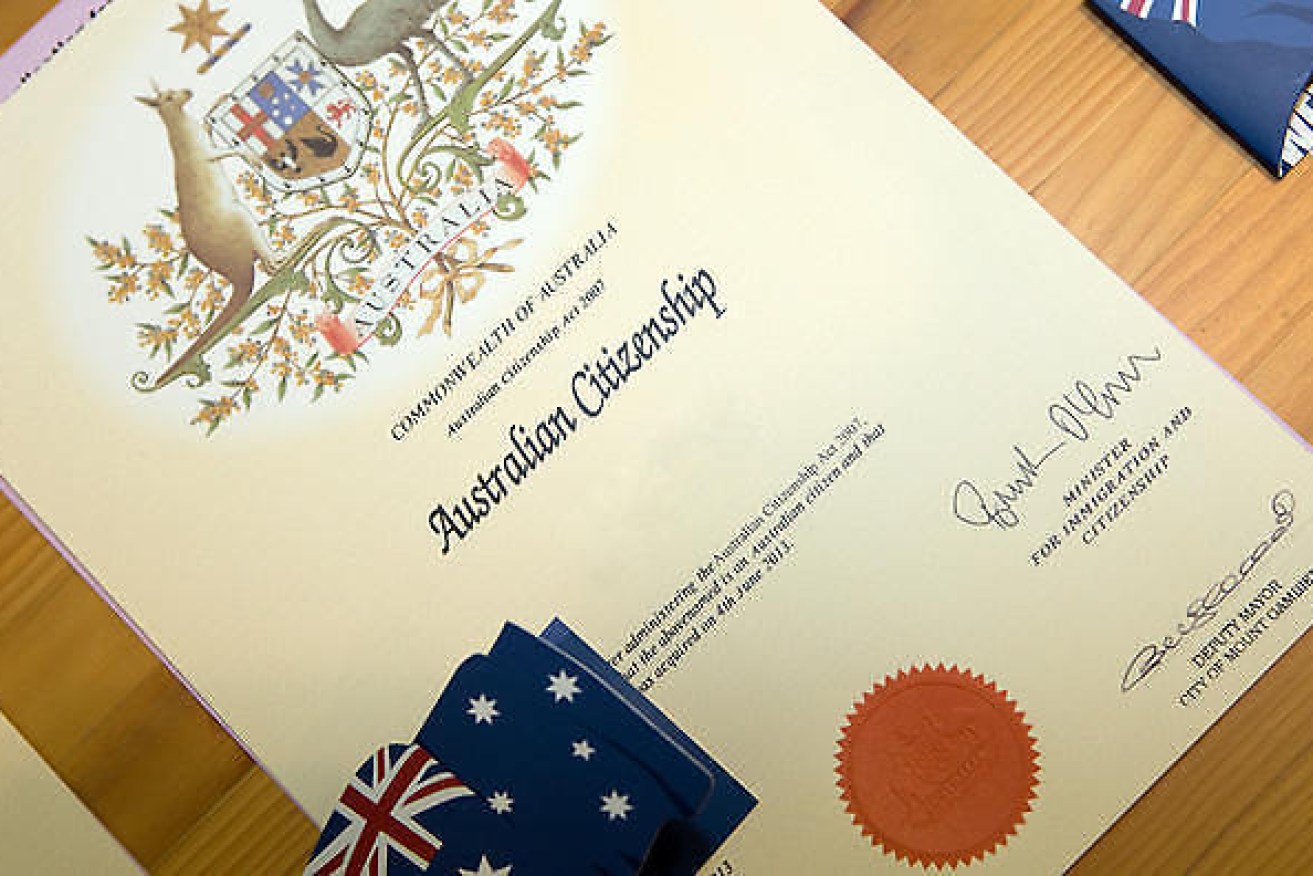More overseas-born politicians could be in trouble over foreign citizenship


The Turnbull government has unveiled plans to change Australia's citizenship laws. Photo: AAP
Larissa Waters, who lost the right to sit in the Senate due to her dual citizenship, has warned that other foreign-born federal politicians could also find themselves in “hot water”.
The citizenship status of overseas-born members of Parliament has been brought into question following two citizenship-related resignations in four days — Greens’ senators Scott Ludlam (New Zealand) and Larissa Waters (Canada).
Of the 22 Australian federal politicians born overseas — excluding the recently resigned senators — 17 confirmed to The New Daily they have renounced their dual citizenship.
These included senators Derryn Hinch (New Zealand), Penny Wong (Malaysia), Sam Dastyari (Iran) and Mathias Cormann (Belgium) among others.
But just three — Anne Aly (Egypt), Ian Goodenough (Singapore) and Tony Abbott (UK) — provided documentation as proof that their “reasonable efforts” occurred prior to their candidacy nomination.
When The New Daily contacted Scottish-born senator Doug Cameron’s office, a spokesman refused to confirm whether the senator was currently a dual citizen and if he had renounced his citizenship.
The spokesman declined to respond to any specific questions relating to Senator Cameron, referring The New Daily to Labor Party acting-national secretary Paul Erickson’s general statement.
“The Labor Party works closely with all our candidates to ensure that their nomination is sound and compliant with the Constitution,” Mr Erickson said.
“We are confident that every member of the Labor caucus has been properly elected.”
Senator Cameron was born in Bellshill, Scotland, in 1951, and immigrated to Australia in 1973.
Former Prime Minister Tony Abbott last week confirmed via social media that he renounced his British citizenship in 1993.
FYI rumour mongers: I renounced my UK citizenship in 1993 and here's the proof: pic.twitter.com/tHAeJeqo5T
— Tony Abbott (@HonTonyAbbott) July 14, 2017
Why foreign-born politicians renounce their citizenship
Section 44 of the Constitution, written in 1901, outlines five grounds whereby a member of Parliament can be disqualified. One of those states that a person is ineligible for Federal Parliament if they hold a foreign citizenship. Any overseas-born member is required to take “reasonable steps” to renounce their foreign citizenship.
Alex Gallacher, Anne Aly and Ian Goodenough told The New Daily they believed the process was justified and the constitution is indisputable.
Meanwhile, Ms Waters told The Project on Tuesday her dual citizenship did not mean she had “any allegiance to Canada”.
“Certainly a lot of politicians were born overseas and if they didn’t realise, like I didn’t, that meant they were automatically citizens of that country, they could be in hot water as well,” she said.
Senator Peter Whish-Wilson described Section 44 as a “technicality”.
While there's no excuses for our party's oversight, it's a cruel shitty blow to us all to lose another great Senator on such a technicality
— Peter Whish-Wilson (@SenatorSurfer) July 18, 2017
Senator Hinch, who said he renounced his citizenship before his Senate nomination, disagreed Section 44 could be dismissed as “a mere oversight [or] technicality”.
Leader of the Australian Greens Richard Di Natale told ABC’s 7.30 on Tuesday the party had called for an “urgent review” of its processes when vetting candidates.
“Two incredibly fine people made bad mistakes and they’re paying for it with their jobs,” he said.
“Our internal processes didn’t pick it up and they should have.”
Modern day relevance of Section 44
Since 1980, there have been at least three calls to overhaul Section 44 including a bill, introduced in 2003, that garnered majority support in the Senate but failed by three votes to obtain an absolute majority.
Australian constitutional lawyer Dr Sangeetha Pillai said a constitutional provision, such as Section 44, could not be removed or amended unless Australian citizens vote in a referendum.
This would require an overall majority across the country as well as a majority of votes in at least four states.
“The rationale behind having the rule is that politicians are elected to serve the Australian people and if they have duties to foreign powers or receive the benefits of a foreign citizenship, then that might lead to a conflict of interest,” Dr Pillai said.
“Some people do say that it should really be up to the Australian people, via the electoral process, to determine whether a person is an appropriate candidate for Parliament.”
Maria Vamvakinou, Tony Zappia, Paul Fletcher and Senator Nigel Scullion were contacted to confirm their citizenship status but did not respond by deadline.
Contacting The New Daily after deadline, Labor MP Brian Mitchell confirmed he renounced his UK citizenship in 2012.
“Didn’t have a ‘I’m not a pom’ party or anything which is a shame as I could have put on some delicacies such as toad in the hole and spotted dick. Nope, didn’t put out any corflutes with “100% Australian”. Dang – wonder if I could have increased my margin by campaigning on my ex-Englishness?” he said.
“I do think it’s time we considered creating a Citizenship Declaration for Candidates whereby all candidates formally foreswear allegiance and citizenship to any nation other than Australia, and vow not to hold a passport of any nation other than Australia.”








